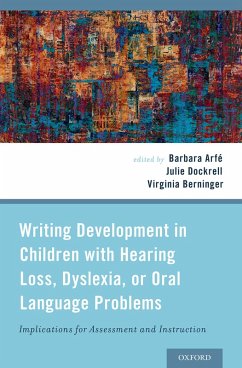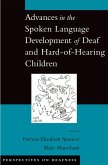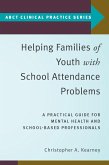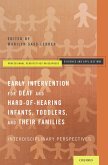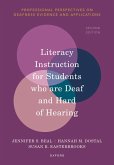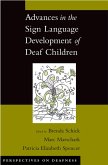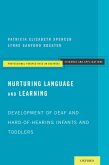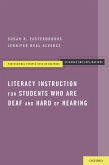Writing Development in Children with Hearing Loss, Dyslexia, or Oral Language Problems (eBook, PDF)
Implications for Assessment and Instruction


Alle Infos zum eBook verschenken

Writing Development in Children with Hearing Loss, Dyslexia, or Oral Language Problems (eBook, PDF)
Implications for Assessment and Instruction
- Format: PDF
- Merkliste
- Auf die Merkliste
- Bewerten Bewerten
- Teilen
- Produkt teilen
- Produkterinnerung
- Produkterinnerung

Hier können Sie sich einloggen

Bitte loggen Sie sich zunächst in Ihr Kundenkonto ein oder registrieren Sie sich bei bücher.de, um das eBook-Abo tolino select nutzen zu können.
Writing is challenging for the majority of learners. For students with language problems, difficulties with written expression are considered one of the most common learning challenges. There is much to learn about the ways in which oral language skills impact on the acquisition of written language in children. Writing Development in Children with Hearing Loss, Dyslexia, or Oral Language Problems focuses on the nature of the writing problems experienced by children with oral language problems. Three clinical groups are considered: children with hearing loss, oral language difficulties, and…mehr
- Geräte: PC
- mit Kopierschutz
- eBook Hilfe
- Größe: 28.22MB
![Advances in the Spoken-Language Development of Deaf and Hard-of-Hearing Children (eBook, PDF) Advances in the Spoken-Language Development of Deaf and Hard-of-Hearing Children (eBook, PDF)]() Advances in the Spoken-Language Development of Deaf and Hard-of-Hearing Children (eBook, PDF)57,95 €
Advances in the Spoken-Language Development of Deaf and Hard-of-Hearing Children (eBook, PDF)57,95 €![Helping Families of Youth with School Attendance Problems (eBook, PDF) Helping Families of Youth with School Attendance Problems (eBook, PDF)]() Christopher A. KearneyHelping Families of Youth with School Attendance Problems (eBook, PDF)31,95 €
Christopher A. KearneyHelping Families of Youth with School Attendance Problems (eBook, PDF)31,95 €![Early Intervention for Deaf and Hard-of-Hearing Infants, Toddlers, and Their Families (eBook, PDF) Early Intervention for Deaf and Hard-of-Hearing Infants, Toddlers, and Their Families (eBook, PDF)]() Early Intervention for Deaf and Hard-of-Hearing Infants, Toddlers, and Their Families (eBook, PDF)51,95 €
Early Intervention for Deaf and Hard-of-Hearing Infants, Toddlers, and Their Families (eBook, PDF)51,95 €![Literacy Instruction for Students Who are Deaf and Hard of Hearing (eBook, PDF) Literacy Instruction for Students Who are Deaf and Hard of Hearing (eBook, PDF)]() Jennifer S. BealLiteracy Instruction for Students Who are Deaf and Hard of Hearing (eBook, PDF)32,95 €
Jennifer S. BealLiteracy Instruction for Students Who are Deaf and Hard of Hearing (eBook, PDF)32,95 €![Advances in the Sign Language Development of Deaf Children (eBook, PDF) Advances in the Sign Language Development of Deaf Children (eBook, PDF)]() Brenda SchickAdvances in the Sign Language Development of Deaf Children (eBook, PDF)63,95 €
Brenda SchickAdvances in the Sign Language Development of Deaf Children (eBook, PDF)63,95 €![Nurturing Language and Learning (eBook, PDF) Nurturing Language and Learning (eBook, PDF)]() Patricia Elizabeth SpencerNurturing Language and Learning (eBook, PDF)42,95 €
Patricia Elizabeth SpencerNurturing Language and Learning (eBook, PDF)42,95 €![Literacy Instruction for Students who are Deaf and Hard of Hearing (eBook, PDF) Literacy Instruction for Students who are Deaf and Hard of Hearing (eBook, PDF)]() Susan R. EasterbrooksLiteracy Instruction for Students who are Deaf and Hard of Hearing (eBook, PDF)45,95 €
Susan R. EasterbrooksLiteracy Instruction for Students who are Deaf and Hard of Hearing (eBook, PDF)45,95 €-
-
-
Dieser Download kann aus rechtlichen Gründen nur mit Rechnungsadresse in A, B, BG, CY, CZ, D, DK, EW, E, FIN, F, GR, HR, H, IRL, I, LT, L, LR, M, NL, PL, P, R, S, SLO, SK ausgeliefert werden.
- Produktdetails
- Verlag: OUP eBook
- Erscheinungstermin: 10. Juli 2014
- Englisch
- ISBN-13: 9780199827299
- Artikelnr.: 41140433
- Verlag: OUP eBook
- Erscheinungstermin: 10. Juli 2014
- Englisch
- ISBN-13: 9780199827299
- Artikelnr.: 41140433
- Herstellerkennzeichnung Die Herstellerinformationen sind derzeit nicht verfügbar.
* Introduction
* Part 1
* Introduction: Models and Perspectives on Writing Development:
Implications for Assessment and Instruction
* Chapter 1. Cognitive Processes in Writing: A Framework
* John R. Hayes and Virginia Berninger
* Chapter 2. Linguistic Perspectives on Writing Development
* Ruth Berman
* Chapter 3. Two Metaphors for Writing Research and Their Implications
for Writing Instruction
* Pietro Boscolo
* Part 2
* The impact of oral language skills on written text production
* Chapter 4. Spelling in Deaf Children with Cochlear Implants:
Implications for Instruction
* Heather Hayes, Rebecca Treiman, and Ann E. Geers
* Chapter 5. Spelling Acquisition in French Children with Cochlear
Implants: A Case-Study Investigation
* Sophie Bouton and Pascale Colé
* Chapter 6. Spelling Abilities in Hebrew-Speaking Children with
Hearing Loss
* Ronit Levie, Dorit Ravid, Tal Freud and Tova Most
* Chapter 7. The Influence of Verbal Working Memory on Writing Skills
in Children with Hearing Loss
* Barbara Arfe, Federica Nicolini, and Elena Pozzebon
* Chapter 8. Composing Academic Essays: Using Dictation and Technology
to Improve Fluency
* John Albertini, Michael Stinson, and Argiroula Zangana
* Chapter 9. Examining Early Spelling and Writing Skills: A Comparative
Analysis of Kindergarteners with Speech and Oral Language Impairments
and Their Typically Developing Peers
* Cynthia S. Puranik, Stephanie Al Otaiba, and Feifei Ye
* Chapter 10. Morphological Awareness and Spelling Difficulties in
French-Speaking Children
* Monique Sénéchal
* Chapter 11. Writing Abilities of Pre-Adolescents with and without
Oral language/Learning Impairment in Restructuring an Informative
Text
* Orna Davidi and Ruth A. Berman
* Chapter 12. Writing Development of Spanish-English Bilingual Students
with Language Learning Disabilities: New Directions in Constructing
Individual Profiles
* Robin L. Danzak and Elaine R. Silliman
* Chapter 13. Written Narratives from French and English Speaking
Children with Language Impairment
* Judy S. Reilly, Josie Bernicot, Thierry Olive, Joël Uzé, Beverly
Wulfeck, Monik Favart, Mark Appelbaum
* Children with Dyslexia
* Chapter 14. A Review of Dyslexia and Expressive Writing in English
* Emma Sumner, Vincent Connelly, and Anna L. Barnett
* Chapter 15. Written Spelling in French Children with Dyslexia
* Séverine Casalis
* Chapter 16. Written Spelling in Spanish- Speaking Children with
Dyslexia
* Francisca Serrano and Sylvia Defior
* Chapter 17. The Writing Development of Brazilian children with
Dyslexia: An Evidence-Based Clinical Approach
* Jane Correa
* Chapter 18. Expressive Writing in Swedish 15-year-olds with Reading
and Writing Difficulties
* Åsa Wengelin, Roger Johansson and Victoria Johansson
* Chapter 19. Improving Expressive Writing in Learning Disabled
Children: The Effects of a Training Focused on Revision
* Martina Pedron, Anna Maria Re, Chiara Mirandola, and Cesare Cornoldi
* Part 3
* Linking Research to Practice in Oral and Written Language Assessment
and Intervention
* Chapter 20. Integrating Language Assessment, Instruction, and
Intervention in an Inclusive Writing Lab Approach
* Nickola Wolf Nelson
* Chapter 21. Integrating Oral and Written Language into a New Practice
Model: Perspectives of an Oral Language Researcher and Practitioner
* Elaine R. Silliman
* Chapter 22. Integrating Writing and Oral Language Disorders in
Assessment: Perspectives of a Writing Researcher
* Vincent Connelly
* Chapter 23. The Role of Oral Language in Developing Written Language
Skills: Questions for European Pedagogy?
* Julie Dockrell and Barbara Arfé
* Bridging Research and Practice: Conclusions
* Introduction
* Part 1
* Introduction: Models and Perspectives on Writing Development:
Implications for Assessment and Instruction
* Chapter 1. Cognitive Processes in Writing: A Framework
* John R. Hayes and Virginia Berninger
* Chapter 2. Linguistic Perspectives on Writing Development
* Ruth Berman
* Chapter 3. Two Metaphors for Writing Research and Their Implications
for Writing Instruction
* Pietro Boscolo
* Part 2
* The impact of oral language skills on written text production
* Chapter 4. Spelling in Deaf Children with Cochlear Implants:
Implications for Instruction
* Heather Hayes, Rebecca Treiman, and Ann E. Geers
* Chapter 5. Spelling Acquisition in French Children with Cochlear
Implants: A Case-Study Investigation
* Sophie Bouton and Pascale Colé
* Chapter 6. Spelling Abilities in Hebrew-Speaking Children with
Hearing Loss
* Ronit Levie, Dorit Ravid, Tal Freud and Tova Most
* Chapter 7. The Influence of Verbal Working Memory on Writing Skills
in Children with Hearing Loss
* Barbara Arfe, Federica Nicolini, and Elena Pozzebon
* Chapter 8. Composing Academic Essays: Using Dictation and Technology
to Improve Fluency
* John Albertini, Michael Stinson, and Argiroula Zangana
* Chapter 9. Examining Early Spelling and Writing Skills: A Comparative
Analysis of Kindergarteners with Speech and Oral Language Impairments
and Their Typically Developing Peers
* Cynthia S. Puranik, Stephanie Al Otaiba, and Feifei Ye
* Chapter 10. Morphological Awareness and Spelling Difficulties in
French-Speaking Children
* Monique Sénéchal
* Chapter 11. Writing Abilities of Pre-Adolescents with and without
Oral language/Learning Impairment in Restructuring an Informative
Text
* Orna Davidi and Ruth A. Berman
* Chapter 12. Writing Development of Spanish-English Bilingual Students
with Language Learning Disabilities: New Directions in Constructing
Individual Profiles
* Robin L. Danzak and Elaine R. Silliman
* Chapter 13. Written Narratives from French and English Speaking
Children with Language Impairment
* Judy S. Reilly, Josie Bernicot, Thierry Olive, Joël Uzé, Beverly
Wulfeck, Monik Favart, Mark Appelbaum
* Children with Dyslexia
* Chapter 14. A Review of Dyslexia and Expressive Writing in English
* Emma Sumner, Vincent Connelly, and Anna L. Barnett
* Chapter 15. Written Spelling in French Children with Dyslexia
* Séverine Casalis
* Chapter 16. Written Spelling in Spanish- Speaking Children with
Dyslexia
* Francisca Serrano and Sylvia Defior
* Chapter 17. The Writing Development of Brazilian children with
Dyslexia: An Evidence-Based Clinical Approach
* Jane Correa
* Chapter 18. Expressive Writing in Swedish 15-year-olds with Reading
and Writing Difficulties
* Åsa Wengelin, Roger Johansson and Victoria Johansson
* Chapter 19. Improving Expressive Writing in Learning Disabled
Children: The Effects of a Training Focused on Revision
* Martina Pedron, Anna Maria Re, Chiara Mirandola, and Cesare Cornoldi
* Part 3
* Linking Research to Practice in Oral and Written Language Assessment
and Intervention
* Chapter 20. Integrating Language Assessment, Instruction, and
Intervention in an Inclusive Writing Lab Approach
* Nickola Wolf Nelson
* Chapter 21. Integrating Oral and Written Language into a New Practice
Model: Perspectives of an Oral Language Researcher and Practitioner
* Elaine R. Silliman
* Chapter 22. Integrating Writing and Oral Language Disorders in
Assessment: Perspectives of a Writing Researcher
* Vincent Connelly
* Chapter 23. The Role of Oral Language in Developing Written Language
Skills: Questions for European Pedagogy?
* Julie Dockrell and Barbara Arfé
* Bridging Research and Practice: Conclusions
